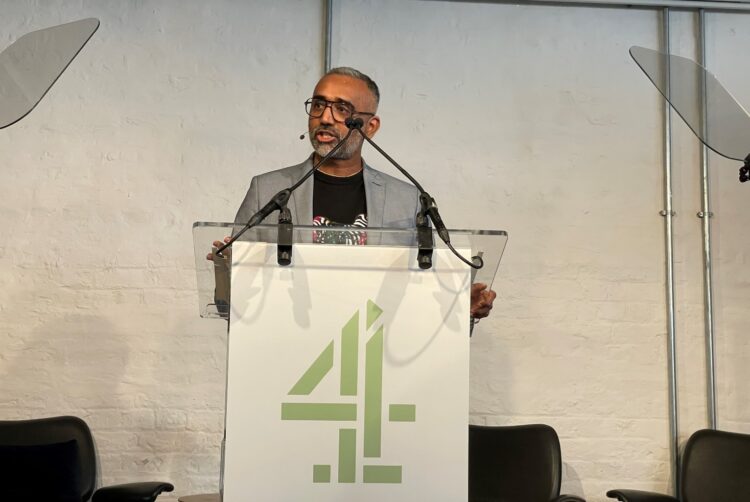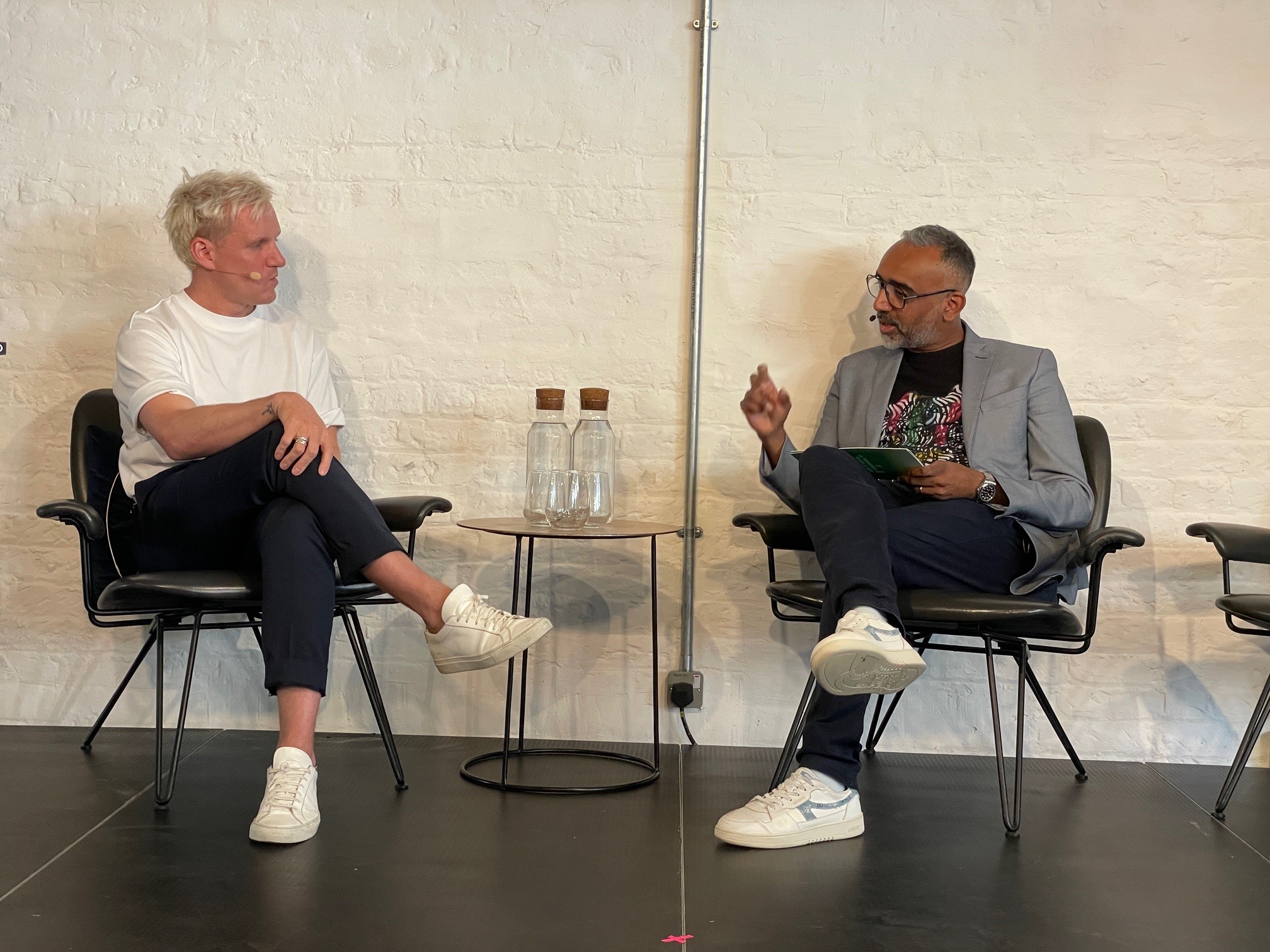Channel 4 commercial chief: Advertisers chase ‘cheap reach’ at Gen Z’s peril

Investing in TV “doesn’t fund hate speech, child abuse, eating disorders, porn, terrorism, riots or platforms that damage our kids’ mental health”, Channel 4’s chief commercial officer appealed to brands at an event promoting the broadcaster’s recent Gen Z: Trends, Truth and Trust research.
During opening remarks, Rak Patel criticised social platforms for failing to protect its users from harmful content and misinformation, and accused advertisers of “shying away from editorial and news because of fears about ‘brand safety‘” and “investing in less-reliable media channels and platforms in pursuit of cheap reach and short-term performance”.
His statement echoed outgoing Channel 4 CEO Alex Mahon‘s own speech in January, where she excoriated social platforms for “a wanton abandonment of the pursuit of truth” and argued in favour of government intervention to require platforms give “algorithmic prominence” to trustworthy public-service media.
“Here among the advertising industry, we must do our part,” Patel continued. “We need to step up to support quality content in trusted environments. Why? Because we continue to see failings among the social platforms.”
He called being regulated by Ofcom a “badge of honour”, admitting that while TV is not “perfect”, its audience protections are “a world away from other forms of media”.
“At Channel 4 Sales under my leadership you’re going to see a laser focus on sales and service,” said Patel. “We’ll work with brands and agencies to jointly find the right solutions, in partnership.”
He concluded: “All of us in this room have a choice. Digital media owners have a choice around the content on their platforms. Advertisers have a choice, they have alternatives, on investing in trusted news sources.”
C4 CEO: Social platforms should give ‘algorithmic prominence’ to public-service media
‘From our networks to theirs’
The comments come even as Channel 4 is itself actively undergoing a transformation to become a digital-first “public streamer” by 2030 via its Fast Forward strategy.
The effort has led to Channel 4’s own embrace of social platforms and YouTube in order to fulfill its remit of providing quality entertainment and information to audiences wherever they may be found.
According to Mahon, it is incumbent on public-service media to “accelerate delivery of our news to these platforms where people consume”, even as it means adapting “from text to video, from long to summary, from our networks to theirs”.
Channel 4 News publishes 25 pieces of content to social platforms daily and last year it achieved 1.8bn views across these platforms. Channel 4.0, the broadcaster’s digital-first brand, recently surpassed 1bn views as well.
Later at the event, held at Elephant and Castle’s The Ministry, Sacha Khari, head of digital commissioning at Channel 4.0, explained that his team works to commission content by collaborating with creators to provide quality programmes that appeal to Gen Z audiences without merely chasing views as a vanity metric.
However, fellow panellist and media personality Nella Rose, who has contributed to a number of Channel 4.0 series such as Tapped Out and Boss Pitches, candidly remarked that she optimises her own social content to engagement, namely views and comments.
Gen Z not homogenous, but trends emerge
Reviewing Channel 4’s Gen Z research, commercial insight manager Katie Gordon and commercial insight analyst Izzy Turner noted that Gen Z are struggling with the concept of truth as their media consumption becomes increasingly digital and personalised.
As Gordon described, on social media there is a “flattening of trust that leads to the curation of their own truths”.
The pair warned, however, that Gen Z is not a monolith, and that many stereotypes about the generation — such as that they are more likely to be politically engaged, left-leaning, and addicted to social media — are not entirely founded.
“Gen Z are not one homogenous group”, they explained.
The challenge for brands is identifying how to reach younger generations on their terms and in the fragmented media environments popular among the cohort. To that end, Gordon and Turner explored a number of thematic suggestions for how brands can appeal to Gen Z, with the word of the day — “authenticity” — predictably muttered dozens of times throughout the morning.
Advice from the broadcaster included acknowledging that traditional markers of adulthood — including stable employment, home ownership and marriage — are now perceived to be out of reach for young people. According to C4’s research, Gen Z on average now believes adulthood “begins” at age 27.
Navigating no man’s land: How brands can truly connect with Gen Z
For brands, it is worth considering how the lack of stability has made for a generation that is more open to trying new things for a longer period of time. Indeed, younger populations were found to be driven to consume items that provide “joy in the smaller moments”, be they online or offline.
Gen Z is thus prone to leaning into the lipstick effect, an economic theory that suggests consumers are more willing to buy less-costly luxury goods during times of economic crisis, rewarding themselves with “little treats”.
In addition, Gen Z was described as caring about social issues, albeit less than immediate tangible concerns in their day-to-day lives. A “flatter hierarchy of trust”, meanwhile, means the cohort is generally sceptical of established media outlets and brands, instead holding greater affinity for individual creators they feel they can relate to and trust, even if those creators are not necessarily experts in a given field.
Providing an alternative to the manosphere
There is also an opportunity for brands to help fulfill an identifiable need for positive male role models that allow young men and boys to embrace non-toxic masculinity without being talked down to.
Patel suggested that Channel 4, like other broadcasters, has a slew of male talent that present more positive representations of masculinity than is typically found on social media and the “manosphere”.
He put forth the example of television personality Jamie Laing (pictured below, left), who sat down with Patel to discuss his career, the importance of mental health advocacy, and his concerns around social media use.

The conversation centred around the increased popularity of manosphere influencers such as Andrew Tate, Joe Rogan and Jordan Peterson, and the dangerous impact social media algorithms can have on young men, as highlighted in Netflix’s recent hit, Adolescence.
Laing suggested, for example, that brands focus on displaying what real success looks like for men in contemporary society to offer a valuable contrast.
For Laing, who acknowledged he comes from a privileged background (he is the great-nephew of the Lord Laing of Dunphail and great-great-grandson McVitie’s founder Sir Alexander Grant), success is defined as building strong interpersonal relationships.
That is distinct from messages most young men are given via their social media feeds, where success equates to “lifting 100kg in the gym and driving a Lamborghini”.
“Young kids and young men are coming out of university or leaving school and feeling really lost,” he continued. “I think it’s really tough to be young at the moment.”




